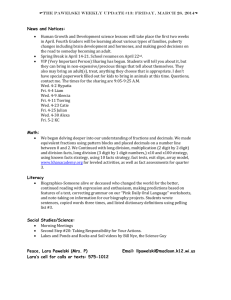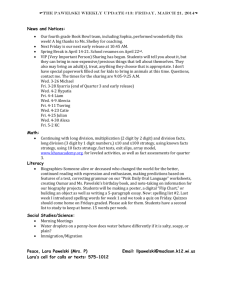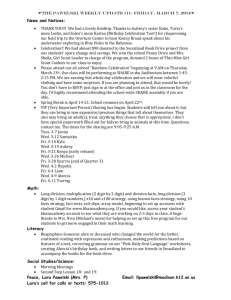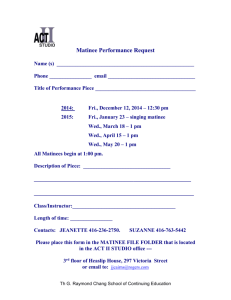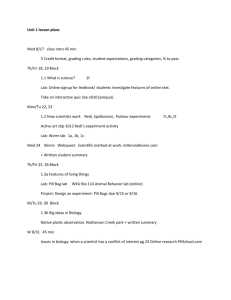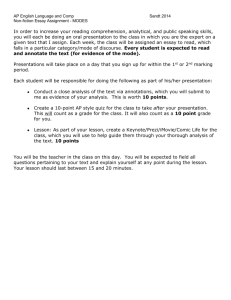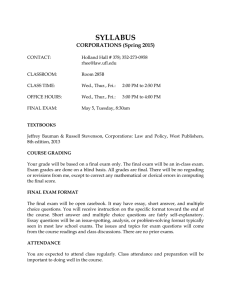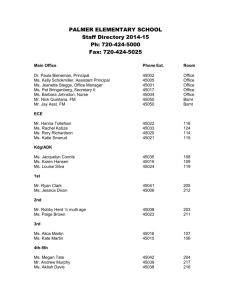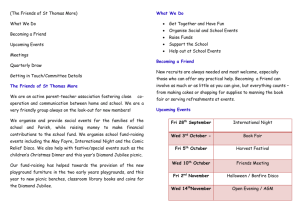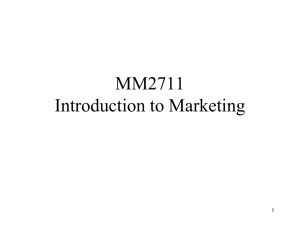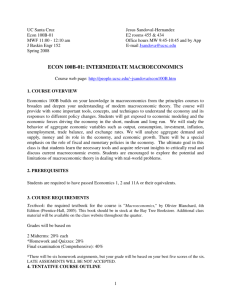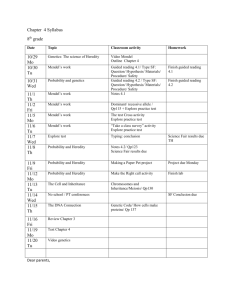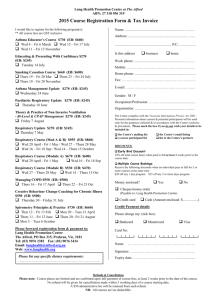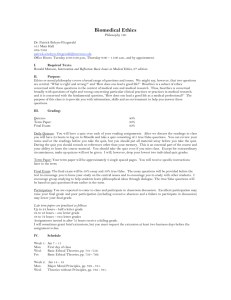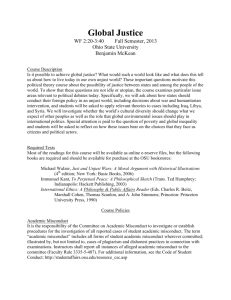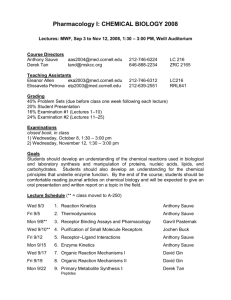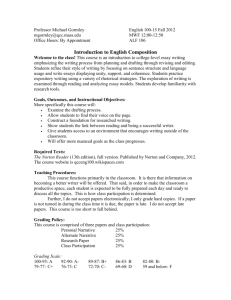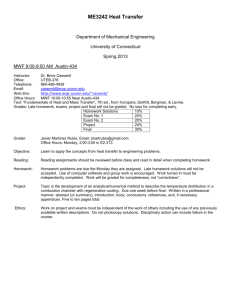Update #9 English - Emerson Elementary School
advertisement
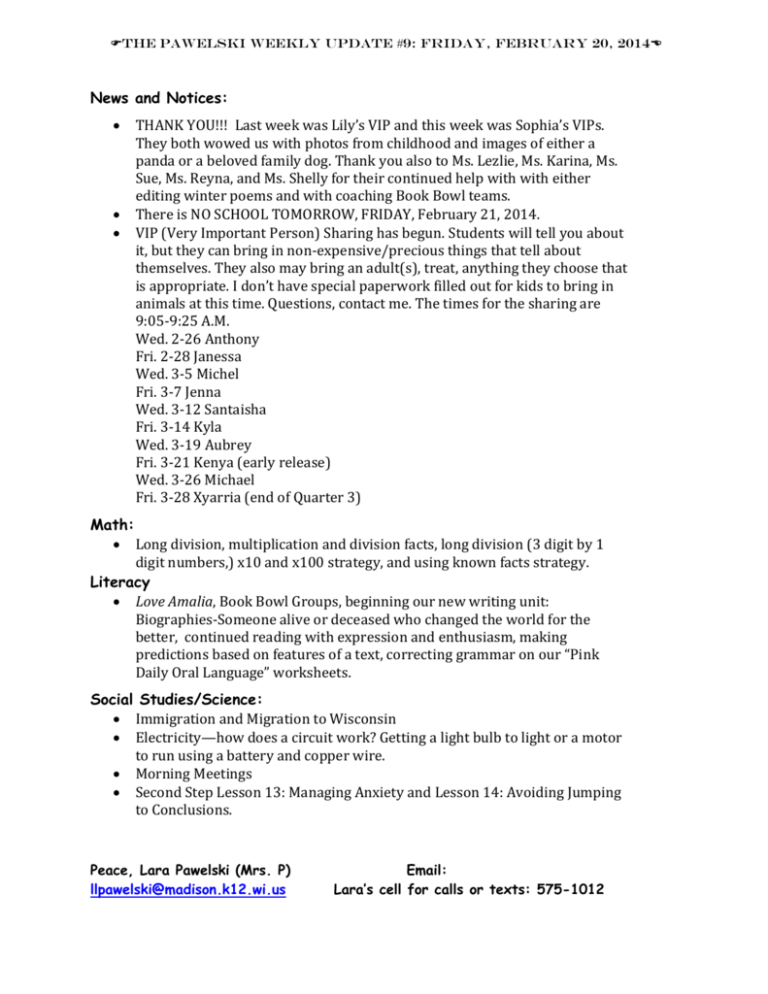
The Pawelski Weekly Update #9: Friday, February 20, 2014 News and Notices: THANK YOU!!! Last week was Lily’s VIP and this week was Sophia’s VIPs. They both wowed us with photos from childhood and images of either a panda or a beloved family dog. Thank you also to Ms. Lezlie, Ms. Karina, Ms. Sue, Ms. Reyna, and Ms. Shelly for their continued help with with either editing winter poems and with coaching Book Bowl teams. There is NO SCHOOL TOMORROW, FRIDAY, February 21, 2014. VIP (Very Important Person) Sharing has begun. Students will tell you about it, but they can bring in non-expensive/precious things that tell about themselves. They also may bring an adult(s), treat, anything they choose that is appropriate. I don’t have special paperwork filled out for kids to bring in animals at this time. Questions, contact me. The times for the sharing are 9:05-9:25 A.M. Wed. 2-26 Anthony Fri. 2-28 Janessa Wed. 3-5 Michel Fri. 3-7 Jenna Wed. 3-12 Santaisha Fri. 3-14 Kyla Wed. 3-19 Aubrey Fri. 3-21 Kenya (early release) Wed. 3-26 Michael Fri. 3-28 Xyarria (end of Quarter 3) Math: Long division, multiplication and division facts, long division (3 digit by 1 digit numbers,) x10 and x100 strategy, and using known facts strategy. Literacy Love Amalia, Book Bowl Groups, beginning our new writing unit: Biographies-Someone alive or deceased who changed the world for the better, continued reading with expression and enthusiasm, making predictions based on features of a text, correcting grammar on our “Pink Daily Oral Language” worksheets. Social Studies/Science: Immigration and Migration to Wisconsin Electricity—how does a circuit work? Getting a light bulb to light or a motor to run using a battery and copper wire. Morning Meetings Second Step Lesson 13: Managing Anxiety and Lesson 14: Avoiding Jumping to Conclusions. Peace, Lara Pawelski (Mrs. P) llpawelski@madison.k12.wi.us Email: Lara’s cell for calls or texts: 575-1012 Homework: 4th Grade Homework: Reading Log, Reader’s Response, Math, and Social Studies Reading Log: Read at least 20 minutes outside of school. This can be at home, at afterschool, at your caregivers, etc. You can read after school or in the morning. You can always read more than 20 minutes. Read at least five (5) days a week. Read every day whenever you can. Each day you read, fill in your log with the date, the title of the book and how many minutes you read. Reader’s Response: One time each week, you will write a Reader’s Response to one of your books. NEW: Write 2-3 sentences that are Summary/Main Idea Topic sentences. This is the Q3 and Q4 reading standard. These sentences tell the important parts of the book or the chapter and answer the questionsWho? What? Where? How? and sometimes Why? Tell it short. Math: 2 single-side pages per night (for example, pages 10-11) in your math workbook, Monday-Thursday, and due on Mondays. Social Studies: Second Step conversations/writing are EXTRA CREDIT should a student or parent feel she or he needs some extra points for work completion in social studies or writing. The Homework Notebook and Math Workbook are due on MONDAYS for stickers, stamps, and other treats at the teacher’s discretion. Blue Eagle Folders and signed Pink Planners should be returned daily. Thanks! Of Note from Emerson’s 4th and 5th Grade Teachers: Suggestions for the Use of Social Media for Fourth and Fifth Graders Students in fourth and fifth grade may be allowed to use social media (the Internet, MMSD student GMail accounts, Skype, video chat, Facebook, instant messaging, and interactive gaming) to socially connect with other peer s and sometimes even adults at home. Beginning this semester, students will use technology to learn typing (Typing Pal Program) and some students may use their student Gmail accounts for assignments. Please see your student’s teacher if you have any questions or comments. Some recommendations if you let your student use social media at home: 1) Consider limiting the time spent. (One hour per day of “Screen Time” maximum is a good general rule for this age group.) 2) What happens at home comes back to school and what happens at school comes back home. (For example, if students are having a conversation via Facebook messenger, the conversation is likely to continue at school. If a conversation arises at school, students may try to problem solve it via messaging, for example.) 3) Facebook is for individuals 13 and older. 4) Be mindful of privacy settings and the information students share.
